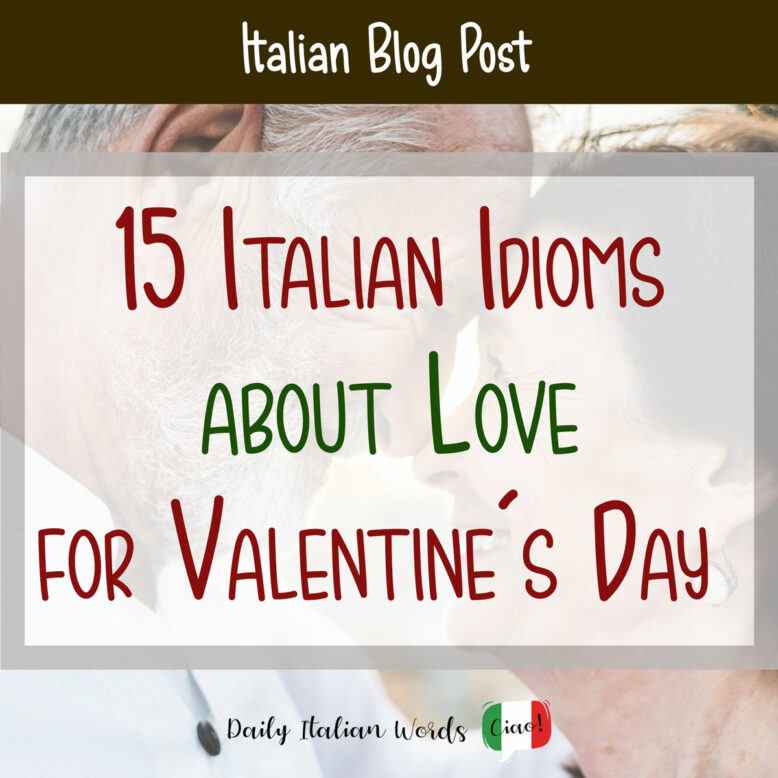Ah, love! Its strength can conquer all obstacles, awaken creativity and drive us to craft beautiful works of art, music, and… idioms!
The Italian language is rich in idioms about love. These gems of popular wisdom are steeped in tradition and offer fascinating insight into the complexities of this beautiful emotion.
So, let’s explore some of the most famous Italian idioms about love. Whether you’re a seasoned romantic or a hopeful dreamer, I’m sure they’ll bring a smile to your face.

Italian Idioms about Couple Life
L’amore non è bello se non è litigarello
Literally: Love with no arguments is not beautiful (= go ahead and have those heated discussions!)
This is one of the most popular Italian idioms about love we use in everyday speech. It celebrates the passionate nature of our culture, reminding us that a little bit of healthy conflict keeps things exciting in a relationship. And as the other Italian old saying goes, Amor senza baruffa, fa la muffa (love with no arguments goes mouldy).
Tra moglie e marito non mettere il dito
Literally: Do not put a finger between wife and husband (= mind your own business!)
Being in a relationship is a beautiful thing, but let’s be honest, it’s not always sunshine and rainbows. There will be moments when tensions rise and disagreements occur. It can be tempting to interfere in someone else’s love problems, but this Italian idiom suggests that it’s best to stay out of it. After all, a couple’s story is just their own.
Amore e gelosia, nascono in compagnia
Literally: Love and jealousy are born together (= healthy jealousy, healthy love life!)
Oh, the passionate emotion that is love! When we love someone deeply, the desire to have them all to ourselves is only natural. So we’re saying here that when those little twinges of jealousy emerge, it’s not something to shy away from. In fact, it’s all part of the game (just as long as they’re handled correctly!).

Italian Idioms about Love Pains
Occhio non vede, cuore non duole
Literally: If the eye doesn’t see, the heart doesn’t hurt (= out of sight, out of mind!)
This Italian idiom is a bit like the saying “ignorance is bliss”, which often holds true when it comes to matters of the heart. When love presents a potentially painful situation (like a betrayal), we usually prefer to keep our eyes closed and use ignorance as our shield, so we don’t suffer.
Delle pene d’amore, si tribola ma non si muore
Literally: Of love’s pains, one suffers but does not die (= you’ll survive!)
The wave of emotions that come with a loss or a disappointment can seem unacceptable. Still, this Italian saying reminds us that time is a great healer. As time goes by, the once overwhelming wave of negative emotions slowly dissipates, allowing the pain to fade away.
Come chiodo scaccia chiodo, così amore scaccia amore
Literally: Like one nail drives out another nail, so one love drives out another love (= happy dating!)
What we are saying here is that a new flame can temporarily ease the pain of a failed relationship, just like a shiny new nail can replace a rusty one. But hold on before you jump into a new romance. As good old Cesare Pavese once said, “one nail drives out another, but four nails make a cross.” Starting a new relationship to escape heartbreak may not always be the answer.

Funny Italian Idioms about Love
Dio li fa e poi li accoppia
Literally: God makes them and then pairs them up (= a match made in heaven!)
This saying often refers to couples who get on well because they share certain characteristics. So much so that it seems as if God himself planned their relationship. A very similar idiom is Chi si somiglia si piglia (Birds of a feather flock together). After all, a shared approach to life brings effortless joy, right?
L’amore è cieco ma vede lontano
Literally: love is blind but sees far (= let love lead the way!)
When we’re deeply in love, our world is a paradise filled with rainbows and butterflies. But, as the saying goes, love can sometimes make us blind and we don’t see our partner’s flaws and problems. This idiom has been used for centuries and in various cultures; however, in Italy, we’ve added a twist: love may be blind, but it’s able to perceive all those qualities in our partner that often go unnoticed by others.
Sfortunato al gioco, fortunato in amore
Literally: Unlucky at games, lucky in love (= save the money and take a chance on love!)
This popular Italian idiom says love and gambling are like oil and water. In short, someone may not have much success or fortune when playing games or gambling, but they seem to have a lot of luck in love and relationships. And since building and maintaining a strong, healthy relationship requires effort, this could ultimately be a sign that you have a lot to offer in relationships.
Chi nasce tondo non può morire quadrato
Literally: One who’s born round cannot die square (= a leopard can’t change its spots!)
A person’s true nature is unlikely to change, so when it comes to love, this means that you should be realistic about what you can expect from your partner. If someone has a habit or behaviour that you find problematic, it’s unlikely they’ll be able to shake it, no matter how much they may want to. So choose wisely!

Gems of popular wisdom
In amore vince chi fugge
Literally: In love, the winner is the one who flees (= embrace your inner runner and discover the thrill being chased in love!)
Here’s the golden rule of seduction: the thrill of uncertainty can ignite the flame more than anything else. Courtship is a big part of the love game, so playing hard to get is often a winning strategy to have the other person interested. And, as our Italian grandmas always say, Se tu vuoi che t’ami, fa’ che ti brami (if you want someone to love you, make them crave you).
L’amore e la tosse non si possono nascondere
Literally: Love and cough cannot be hidden (= live in the moment and show off your love!)
Have you ever tried to hide a cough? Not easy, right? Well, love is just like that! This Italian saying perfectly captures love’s irresistible force. Whether it’s a spark or an intense flame, love simply can’t be hidden. You may try to play it cool and pretend you’re not feeling it, but eventually, the truth will come out.
Il primo amore non si scorda mai
Literally: The first love is never forgotten (= embrace the memories of that special someone!)
Who doesn’t recall those first butterflies in their stomach when they fell head over heels in love for the first time? This well-known Italian idiom about love speaks to the undeniable power of first love and how its impact stays with us for a lifetime.
L’amore vero non si vende e non si compra
Literally: True love cannot be bought or sold (= spend your heart’s currency wisely!)
Among the best Italian idioms about love, this one stands out. True love is the one thing money can’t buy. Yes, you can shower your partner with gifts and take them on exotic vacations, but the real magic of love is in the connection itself. So, put down your wallet and focus on the love – that’s all you need.
Al cuore non si comanda
Literally: You can’t command the heart (= let’s follow our hearts and see where they take us!)
How many of us have struggled with that inner battle between our minds and hearts when it comes to love? We’ve all been caught in endless debates about what we want and what we feel. But the truth is that love and all other powerful emotions associated with it comes from deep within us, and it’s something that we simply can’t control or force.
Valentina is a travel writer in love with her country. Having travelled widely around the globe, she realised there was more to explore closer to home and decided to put the passport aside for a while. You can follow her adventures around Italy on her blog myitaliandiaries.com.

Valentina Nicastro is a travel writer in love with her home country, Italy. Having travelled widely around the globe, she realised there was more to explore closer to home and decided to put the passport aside for a while. When she is not immersed in documenting Italy, you’ll find her donning her communication consultant hat, weaving words as a content writer and bridging linguistic divides as a translator.


